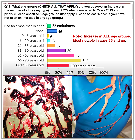
#DIED SUDDENLYS - Dr. John Campbell & Major Tom Haviland show the survey results of increased fibrous mystery blockages removed from arteries during the embalming process. Embalmers all over are confirming these findings in the bodies being brought in following the Covid Vaccine rollout.
(media.greatawakening.win)
🧠 SUDDENLY 🕳️

They mentioned additional mRNA vaccines coming out next year. Here's from the Penn Medicine website:
What's Next? The Future of mRNA Vaccines for “Every Imaginable Infectious Disease”
The mRNA platform created at Penn Medicine ignited a global renaissance in RNA biology research. Scientists in industry and at universities worldwide are finding new and innovative ways to use mRNA technology to prevent and treat disease.
“We're working on every imaginable infectious disease." Drew Weissman, MD, PhD, Roberts Family Professor in Vaccine Research At Penn, our researchers are using the mRNA platform to create vaccines for a wide variety of conditions.
mRNA Vaccines for Infectious Diseases Before COVID-19 erupted, a Penn-developed mRNA influenza (flu) vaccine was already in clinical trials. This existing work directly contributed to the speed at which drug makers could produce the mRNA COVID-19 vaccines.
With fast development and production times, mRNA vaccines are ideal for protection against new infectious diseases and variants of existing ones. Our researchers are at the forefront of mRNA vaccines for numerous infectious disease vaccines, including the following.
All Coronaviruses, such as SARS and MERS
C. difficile
Genital Herpes (HSV-2)
Hepatitis C
HIV
mRNA for Influenza
Leptospirosis
Malaria
Norovirus
Tuberculosis mRNA Vaccines for Cancer While the mRNA vaccines for COVID-19 and other infectious diseases prevent disease, mRNA technology can also help treat existing diseases like cancer. The platform's flexibility allows researchers to create mRNA cancer vaccines that activate the immune system to attack cancer cells. mRNA Treatment for Food and Environmental Allergies Penn researchers are working on a vaccine to stop the body's production of immunoglobulin E (IgE) antibodies that can cause severe attacks in people with peanut allergies. Additional efforts target dust mite allergies. mRNA and Genetic Diseases Penn scientists are studying ways that mRNA could deliver replacement genes or repair defective genes to treat diseases such as:
Cystic Fibrosis
Sickle Cell Anemia mRNA for Heart Attack and Stroke
Cutting-edge cancer and COVID-19 approaches could reduce organ scarring | Science | AAAS mRNA Therapies for Neurodevelopmental Disorders Penn scientists are considering RNA therapeutics for reducing conditions leading to fatal neurodegenerative diseases like amyotrophic lateral sclerosis (ALS) and frontotemporal dementia.